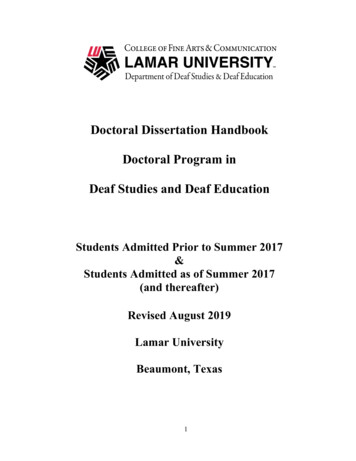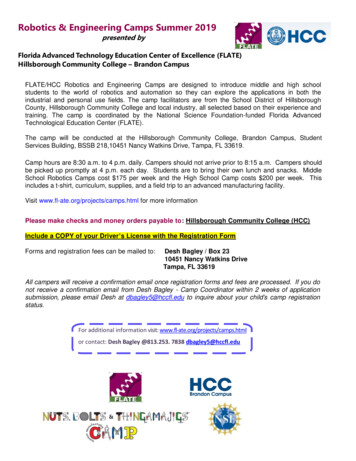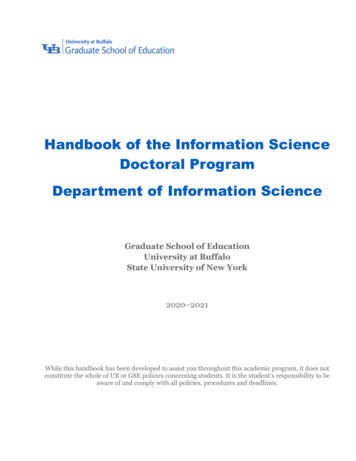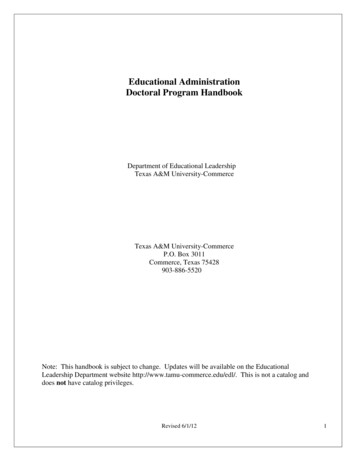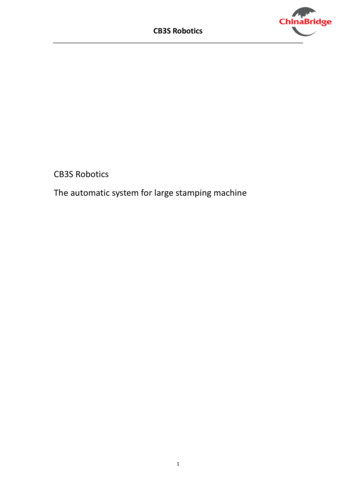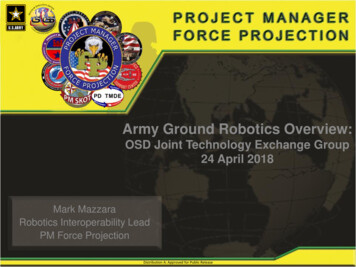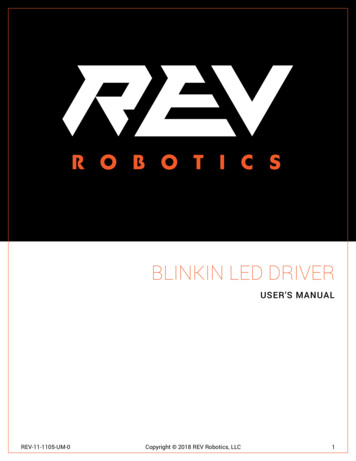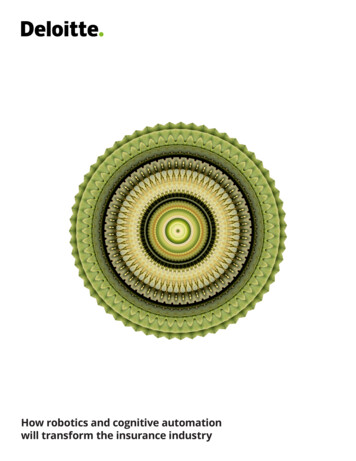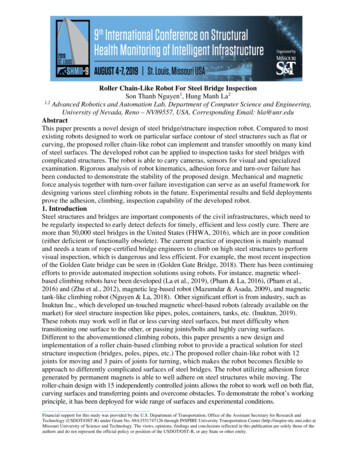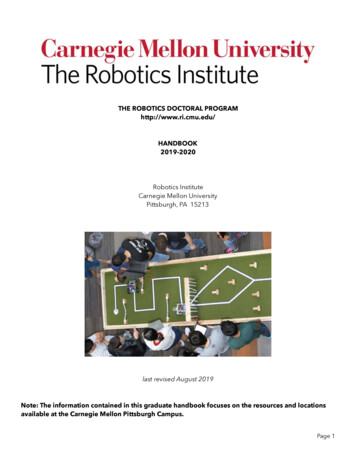
Transcription
THE ROBOTICS DOCTORAL tics InstituteCarnegie Mellon UniversityPittsburgh, PA 15213last revised August 2019Note: The information contained in this graduate handbook focuses on the resources and locationsavailable at the Carnegie Mellon Pittsburgh Campus.Page 1
WelcomeTable of Contentspg. 5Mission or Philosophypg. 6Degrees Offeredpg. 7Graduate Student HandbookUniversity Policies & ExpectationsCarnegie Mellon Statement of AssuranceThe Carnegie Mellon Codepg. 8pg. 8pg. 9Departmental ResourcesDepartmental PersonnelDepartmental InformationDepartment DirectoryMailGraduate Student TravelCopy, Printing, ScanningConference & ClassroomsConference & Classrooms Audio/Video SupportCreative MediaEmergency SituationsPhone Usage & InformationRoboOrgSCS Computing FacilitiesWho to See for WhatDepartment Approach to Press & Media RelationsAcademic CalendarWomen@SCSDegree AttainmentStatute of LimitationsFull-time/Part-time Status RequirementsDepartment Registration Process / ProceduresCourse of StudyOverviewPreparationCourse QualifiersCore Course QualifierSpecialized Course QualifierWaiversResearch QualifierResearch SkillsSpeakingWritingTeaching (Non-Native Speakers of English)Master’s Writing and Speakingpg. 10pg. 11pg. 13pg. 13pg. 13pg. 13pg. 14pg. 17Page 2
ThesisRobotics OrientationAdvising and The Matching ProcessTimeline of StudyReview of ProgressMaster’s Degree in RoboticsCore CoursesPerception Core CoursesCognition Core CoursesAction Core CoursesMath Foundations Core Coursepg. 18pg. 19pg. 20pg. 20pg. 21pg. 22pg. 22Research Qualifierpg.24Independent Studypg.25Resources and Regulations Governing Research at Carnegie MellonOffice of Sponsored ProgramsOffice of Research Integrity & ComplianceIntellectual Property PolicyPolicy on Restricted ResearchHuman Subjects in Research Policypg. 26pg. 26pg. 26pg. 26pg. 26Course Requirements and Related Policies/ProtocolsRegistration PoliciesDouble Counting CoursesDrop/Add/Withdraw ProceduresTransfer Course Credit & PCHECourse Audit PolicyGrades & GradingProcess for Appealing Final GradesAcademic Integritypg. 26pg. 26pg. 26pg. 26pg. 27pg. 27pg. 27pg. 28PhD Criteria for Advancement to CandidacyUniversity Policy for Doctoral StudentsInternship OpportunitiesGraduation and CertificationLeave of Absence and WithdrawalWithdrawal of DegreeEnrollment VerificationDirected Researchpg. 28pg. 28pg. 28pg. 29pg. 29pg. 29pg. 29Additional Department Policies/ProtocolAssistance for Individuals with DisabilitiesSummary of Graduate Student Appeal & Grievance Procedurespg. 30pg. 30Safeguarding Educational Equity Policy Against SexualHarassment and Sexual Assaultpg. 31Page 3
Maternity Accommodation ProtocolChange of Address“Grandfather” PolicyFinancial SupportStipendsSummer StipendTuitionFellowshipsConsulting and Outside EmploymentSemester Breaks and VacationsTaxespg. 31pg. 32pg. 32pg. 32pg. 33pg. 33pg. 33pg. 34pg. 34Financial Aid InformationFinancial AssistanceUniversity Financial Aidpg. 34pg. 34Estimates of the Time Allocated to Each Component of the Ph.D. Programpg. 35Appendix A - University Resources for Graduate Students and the WORD, Student HandbookKey Offices for Graduate Student SupportGraduate Education OfficeOffice of the Dean of StudentsCenter for Student Diversity & InclusionAssistance for Individuals with DisabilitiesEberly Center for Teaching Excellence & Educational InnovationGraduate Student AssemblyIntercultural Communication Center (ICC)Office of International EducationVeterans and Military CommunityCarnegie Mellon Ethics HotlinePolicy Against Retaliationpg. 36pg. 36pg. 37pg. 38pg. 38pg. 38pg. 39pg. 39pg. 39pg. 39pg. 40Key Offices for Academic & Research SupportAcademic Coaching/Consulting - The Office of Academic DevelopmentComputing and Information ResourcesGlobal Communication CenterResearch at CMUOffice of Research Integrity & Compliancepg. 40pg. 41pg. 41pg. 42pg. 42Key Offices for Health, Wellness & SafetyCounseling & Psychological ServicesHealth ServicesCampus WellnessReligious and Spiritual Life Initiative (RSLI)University PoliceShuttle and Escort Servicepg. 42pg. 42pg. 43pg. 43pg. 43pg. 43The WORDpg. 44Page 4
WelcomeWe are proud of the open, friendly culture that hasbeen the hallmark of the Robotics Institute since itsinception. Faculty keep their office doors open toencourage informal meetings with students andcolleagues. Graduate students organize frequentdepartment-wide social activities, ranging fromFriday afternoon get-togethers to rock climbingtrips. And the department’s strong support forcollaboration creates an ideal environment forworld class robotics research.The Robotics Institute is an intellectually diverse,multi-disciplinary department. The Institute’s facultyand students come from a wide variety ofbackgrounds and represent many unique areas ofexpertise. This diversity stems from the multidisciplinary nature of the robotics, whichencompasses aspects of computer science,mechanical engineering, electrical engineering,psychology, and many other disciplines.The Robotics Institute is an international leader in robotics education. The world’s first Robotics PhDprogram was founded here in 1988 with the goal of providing graduate students with the knowledge,experience, and skills to become the next leaders in robotics research and education. Graduates from thePhD program have taken on roles ranging from faculty in top universities, to designing and controlling Marsrovers, to develop Google’s self-driving cars.Since the start of the Robotics PhD program, we have steadily grown and expanded our programs of study.Today, we offer diverse opportunities at all levels of education - from masters programs and anundergraduate minor for Carnegie Mellon students down to the K-12 level, where our renowned programs,workshops, and summer classes inspire and educate the next generation of roboticists.While this handbook is specific to your academic experience in the department, there are several otherresources and offices graduate students are encouraged to consult during their tenure at Carnegie MellonUniversity. Information about The Word, the student handbook, the Office of the Assistant Vice Provost forGraduate Education, the Office of the Dean of Student Affairs and others are included in Appendix A of thishandbook.Page 5
Mission or Philosophy/Brief Overview of DepartmentEven when robotics technologies were relatively primitive, their potential role in boosting the productivityand competitiveness of the United States was foreseen in the evolving global marketplace. The RoboticsInstitute at Carnegie Mellon University was established in 1979 to conduct basic and applied research inrobotics technologies relevant to industrial and societal tasks. Seeking to combine the practical and thetheoretical, the Robotics Institute has diversified its efforts and approaches to robotics science whileretaining its original goal of realizing the potential of the robotics field.Page 6
Degrees OfferedPhD ProgramsDoctor of Philosophy (PhD) The world's first doctoral program in robotics prepares graduatestudents to be tomorrow's leaders in robotics research.Center for the Neural Basis of Cognition Option The Center for the Neural Basis of Cognitionoffers an interdisciplinary training program operated jointly with affiliated doctoral programsat Carnegie Mellon University and the University of Pittsburgh. The affiliated programsinclude Robotics, Computer Science, Psychology, and Statistics at Carnegie Mellon, andMathematics, Psychology, and the Program in Neuroscience at the University of Pittsburgh.The CNBC option for Robotics Ph.D. students allows them to combine intensive training in RIwith a broad exposure to cognitive science, neural computation, and other disciplines thattouch on problems of higher brain function.Students must also be separately admitted to the CNBC program; they fulfill the same basicrequirements as regular Ph.D. students in Robotics but have additional requirements to fulfill.Masters ProgramsMaster of Science (MSR) A two year masters program that teaches the fundamentals of roboticstheory and practice through coursework and independent research.BS plus MS in Robotics (Accelerated Graduate Program) A special masters program that enablesCarnegie Mellon undergraduates to complete a masters degree in their fifth year.Master of Science - Robotic Systems Development (MRSD) This program is designed to becompleted full-time in 21 consecutive months. It’s an advanced graduate degree with a combinedtechnical/business focus for recent-graduates/practicing-professionals engaged in, or wishing toenter, the robotics and automation field as practitioners in the commercial sector.Master of Science - Computer Vision (MSCV) A 16 month masters program that teaches thefundamentals of computer vision theory to prepare students for careers in industry.Undergraduate ProgramsAdditional Major in Robotics The Additional Major in Robotics focuses on the theme that roboticsis both multidisciplinary and interdisciplinary. The Additional Major is open to students in any majorof any college at Carnegie Mellon.Minor in Robotics The Minor in Robotics provides an opportunity for undergraduate students atCarnegie Mellon to learn the principles and practices of robotics through theoretical studies andhands-on experience.Page 7
Graduate Student HandbookUniversity Policies & ExpectationsIt is the responsibility of each member of the Carnegie Mellon community to be familiar with universitypolicies and guidelines. In addition to this departmental graduate student handbook, the followingresources are available to assist you in understanding community expectations:The Word/Student Handbook: demic Integrity Website: ife/academicintegrity.htmlUniversity Policies Website: www.cmu.edu/policies/Graduate Education Website: uld you need any of the above resources in a different format, you may contact the GraduateProgram Coordinator, Suzanne Muth.Please see Appendix A for additional information about The Word and University resources.Carnegie Mellon University Statement ofAssuranceCarnegie Mellon University does not discriminate inadmission, employment, or administration of itsprograms or activities on the basis of race, color,national origin, sex, handicap or disability, age,sexual orientation, gender identity, religion, creed,ancestry, belief, veteran status, or geneticinformation. Furthermore, Carnegie MellonUniversity does not discriminate and is required notto discriminate in violation of federal, state, or locallaws or executive orders.Inquiries concerning the application of and compliance with this statement should be directed to thevice president for campus affairs, Carnegie Mellon University, 5000 Forbes Avenue, Pittsburgh, PA15213, telephone 412-268-2056.Obtain general information about Carnegie Mellon University by calling 412-268-2000.The Statement of Assurance can also be found on-line at: ernance/statement-of-assurance.htmlPage 8
The Carnegie Mellon CodeStudents at Carnegie Mellon, because they are members of an academic community dedicated to theachievement of excellence, are expected to meet the highest standards of personal, ethical and moralconduct possible.These standards require personal integrity, a commitment to honesty without compromise, as well astruth without equivocation and a willingness to place the good of the community above the good of theself. Obligations once undertaken must be met, commitments kept.As members of the Carnegie Mellon community, individuals are expected to uphold the standards ofthe community in addition to holding others accountable for said standards. It is rare that the life of astudent in an academic community can be so private that it will not affect the community as a whole orthat the above standards do not apply.The discovery, advancement and communicationof knowledge are not possible without acommitment to these standards. Creativitycannot exist without acknowledgment of thecreativity of others. New knowledge cannot bedeveloped without credit for prior knowledge.Without the ability to trust that these principleswill be observed, an academic communitycannot exist.The commitment of its faculty, staff and studentsto these standards contributes to the highrespect in which the Carnegie Mellon degree isheld. Students must not destroy that respect bytheir failure to meet these standards. Studentswho cannot meet them should voluntarilywithdraw from the university.The Carnegie Mellon Code can also be found on-line e 9
Departmental ResourcesDepartment Personnel‣Martial Hebert, Dean of School of Computer Science‣Srinivasa G. Narasimhan, Interim Director of the Robotics Institute‣David Wettergreen, Associate Director for Education, Director of the Ph.D. Program, ResearchProfessor‣George Kantor, Director of the Masters Program, Senior Systems Scientist‣John Dolan, Director of the M.Sc. Robotic Systems Development, Principal Systems Scientist‣Kris Kitani, Director of the M.Sc. in Computer Vision Program, Associate Research Professor‣Hartmut Geyer, Chair of the Graduate Program Committee, Associate Professor‣Howie Choset, Kavcic-Moura Professor of Computer Science‣Illah Nourbakhsh, Associate Director for Faculty, Professor‣Cheryl Wehrer, Associate Director for Finance and Administration‣Suzanne Muth, Graduate Program Manager‣Sarah Conte, Academic Program Manager‣Barbara Jean Fecich, Academic Program Manager‣Robotics Faculty‣Robotics Office Staff‣Robotics Main Office and Phone Number, Newell Simon Hall 4000B, 412.268.3818‣SCS Computing Facilities‣Graduate Student Department/College OmbudsmanDavid Wettergreen and George Kantor serve as ombudspersons for graduate students toassist with difficult academic or personal situations where a confidential sounding board and/or an intermediary can be helpful. Examples of situations where students are encouraged toseek advice or assistance include: Difficulty in communications with advisor, particularly when those difficulties may lead toconsidering changing advisors or leaving the programConflict with other group members that is difficult to resolve within the groupIssues related to diversity or the departmental climate for those in groups who arehistorically underrepresented in sciencePersonal concerns that interfere significantly with the ability to make timely progress inresearch or program requirements. These might be due to health, family or financialchallenges.Additionally, students may confer with the university graduate student ombudsman, SuzieLaurich-McIntyre, slaurichmcintyre@cmu.edu, on issues of process or other concernsas they navigate conflicts. Suzie Laurich-McIntyre is the Assistant Vice Provost forGraduate Education.Page 10
Departmental InformationDepartment DirectoryMailThe correct mailing address to use is: Your Name, The Robotics Institute, 4000 B NewellSimon Hall, Carnegie Mellon University, 5000 Forbes Avenue, Pittsburgh PA 15213.Graduate Student TravelWhen funding is available, we support graduate student travel to present papers at refereedconferences, to attend meetings required by research sponsors, or to attend other functionsas directed by the faculty.Graduate student travel must be approved in advance by the student's advisor. For travel to aconference, approval must be obtained before the paper is submitted to the conference; forother travel, approval must be obtained before the student can make a commitment toattend.It is generally expected that the student's advisor, or other faculty member overseeing thetravel, will arrange for funding before granting approval for the travel. If no faculty support isavailable, the student should contact the Ph.D. Program Chair for approval of departmentalsponsorship. The maximum to be reimbursed will be 200 plus the registration fee, if onlyattending the conference or workshop; 600 plus registration fee, if presenting a paper.GuSH Research Funding is a source of small research grant funds provided by GSA and theProvost’s Office and managed by the Graduate Education Office. Students can find moreinformation about the process and deadlines at: ent/index.htmlFunding must be arranged before the travel request can be approved.If there are visa concerns for graduate student travel, check the U.S. State Department's Travel& Living Abroad page.Copy, Printing, ScanningConference & ClassroomsConference & Classroom Audio/Video SupportCreative MediaThe Robotics Creative Media is an online resource available to students who needinformation regarding HD video production, audio production, design & print, such asbusiness cards, photography, event materials and specialty items.Emergency SituationsPhone Usage & InformationPage 11
RoboOrg – The Robotics Student OrganizationSCS Computing FacilitiesWho to See for WhatDepartment Approach to Press and Media RelationsTo assure consistency in all communications and to maximize external visibility to targetaudiences the marketing and communication staff works together to coordinate keymessages and activities involving publicity.The director of media relations in the SCS Dean’s Office, Byron Spice, is the point-of-contactbetween news media and the School of Computer Science community, including faculty,students, administrators and staff. He can assist with strategic planning for publicity, interviewpreparation, and (depending on the specific project or issue) may assist in developing newsstories or multi-media for the SCS website and social media channels.Academic CalendarThe Academic Calendar can be found at https://www.cmu.edu/hub/calendar/index.html andprovides information on all deadlines including registration dates, class start dates, add/dropdeadlines, exam dates and more.Women@SCSPage 12
Degree AttainmentStatute of LimitationsAs outlined in the Doctoral Student Status Policy, students will complete all requirements for the Ph.D.degree within a maximum of ten years from original matriculation as a doctoral student. Once this timeto-degree limit has lapsed, the person may resume work towards a doctoral degree only if newlyadmitted to a currently offered doctoral degree program under criteria determined by that program.Under extraordinary circumstances, such as leave of absence, military or public service, family orparental leave, or temporary disability, a school or college may, upon the relevant department'srecommendation and with the written approval of the dean, defer the lapse of All But Dissertation statusfor a period commensurate with the duration of that interruption.Students, who are pursuing the Ph.D. degree as part-time students for all semesters of their program, asapproved by their program, may also appeal to their program or department for extension of the time todegree limit.Full-time/Part-time Status RequirementsIt is expected that Doctoral students will maintain full-time status throughout the program. Internationalstudents must be full-time status for all semesters and need to consult the Office of InternationalEducation if they may not be in full-time status. Part-time status would need to be approved by the Chairof the Doctoral Program in Robotics, David Wettergreen.Department Registration Process / ProceduresIf is the full responsibility of the student to register for courses. Each semester students should consultwith their advisor/s before registering for courses.Course of StudyOverviewThis document defines the degree requirements for candidates in the Ph.D. Program in Roboticsin the School of Computer Science at Carnegie Mellon University. The program is designed sothat a well-prepared student can complete the doctoral degree in four
Writing Teaching (Non-Native Speakers of English) Master’s Writing and Speaking . Global Communication Center pg. 41 Research at CMU pg. 42 Office of Research Integrity & Compliance pg. 42 . at Carnegie Mellon University
